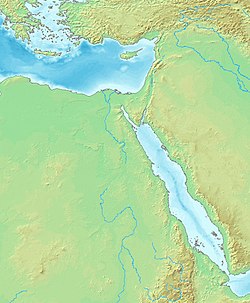Kawa, known as Patigga or Patinga during Greek and Roman times, is a town and archaeological site in Sudan, located between the Third and Fourth Cataracts of the Nile on the east bank of the river, across from Dongola. In ancient times it was the site of several temples to the Egyptian god Amun, built by the Egyptian rulers Amenhotep III and Tutankhamun, and by Taharqa and other Kushite kings.[1]
Location of Kawa

Westerners became aware of the site in the late 19th century.[2] Small digs were carried out in 1929 and 1930 and an extensive excavation began 22 November 1930.[2]
Shrine of Taharqa
editA temple of Amun-Re commissioned by Taharqa once existed at Kawa.[3][4] A small shrine from within that temple, known as the Shrine of Taharqa, is in the Ashmolean Museum.[5][4]
-
The Shrine of Taharqa, Ashmolean Museum
-
Shrine and Sphinx of Taharqa. Taharqa appears between the legs of the Ram-Sphinx
-
The Ram-Sphinx and Taharqa
-
Relief of Taharqa on the shrine
See also
editReferences
editWikimedia Commons has media related to Kawa.
- ^ Wilkinson, Richard H. (2000). The Complete Temples of Ancient Egypt. Thames & Hudson. pp. 11, 232
- ^ a b Kirwan, L. P. (1936). "Preliminary Report of the Oxford University Excavations at Kawa, 1935-1936". The Journal of Egyptian Archaeology. 22 (2): 200-211. doi:10.2307/3854627.
- ^ Macadam, M. F. Laming (1955). The Temples of Kawa II. History and Archaeology of the Site. Oxford University Press. p. 61.
- ^ a b Armstrong, Caroline H (2015). "The Two Non-Blue Amuns of the Shrine of Taharqa at Kawa". The Journal of Egyptian Archaeology. 101 (1). SAGE Publications: 177–195. doi:10.1177/030751331510100109. ISSN 0307-5133.
- ^ "Taharqa Shrine". Ashmolean Museum.
- ^ Museum notice
